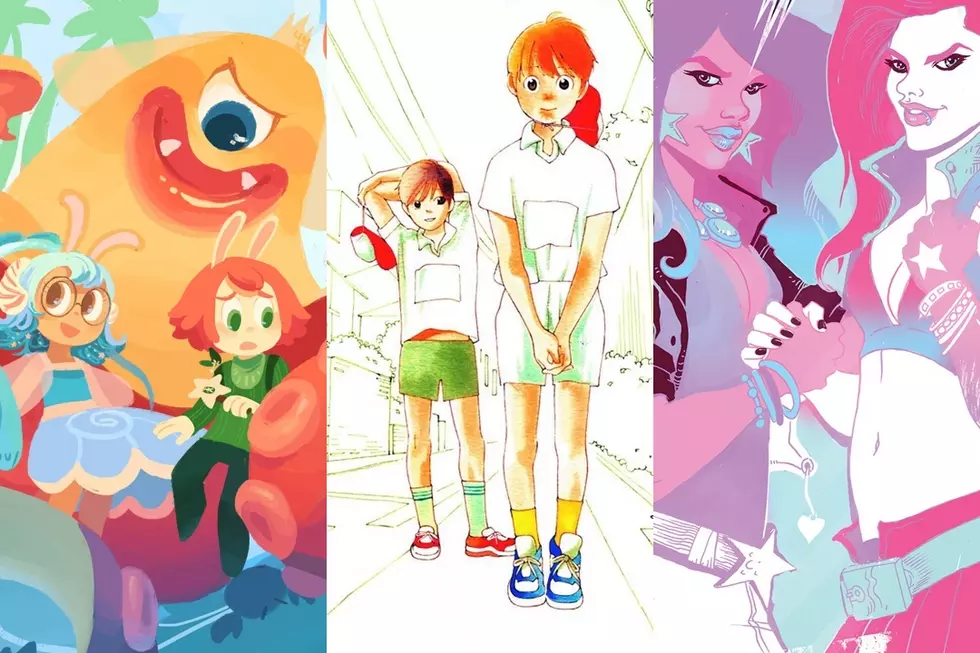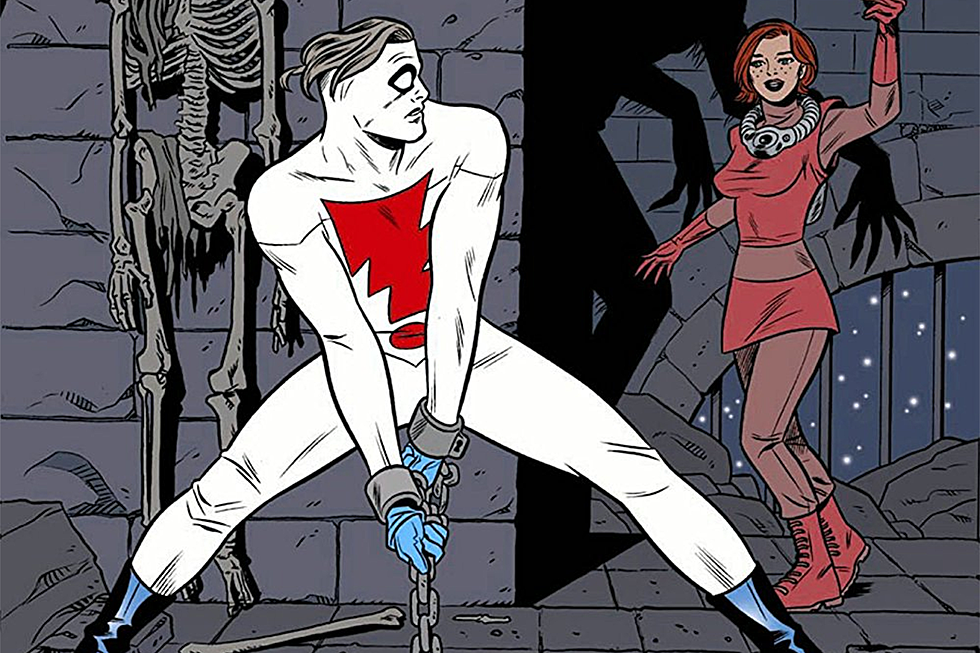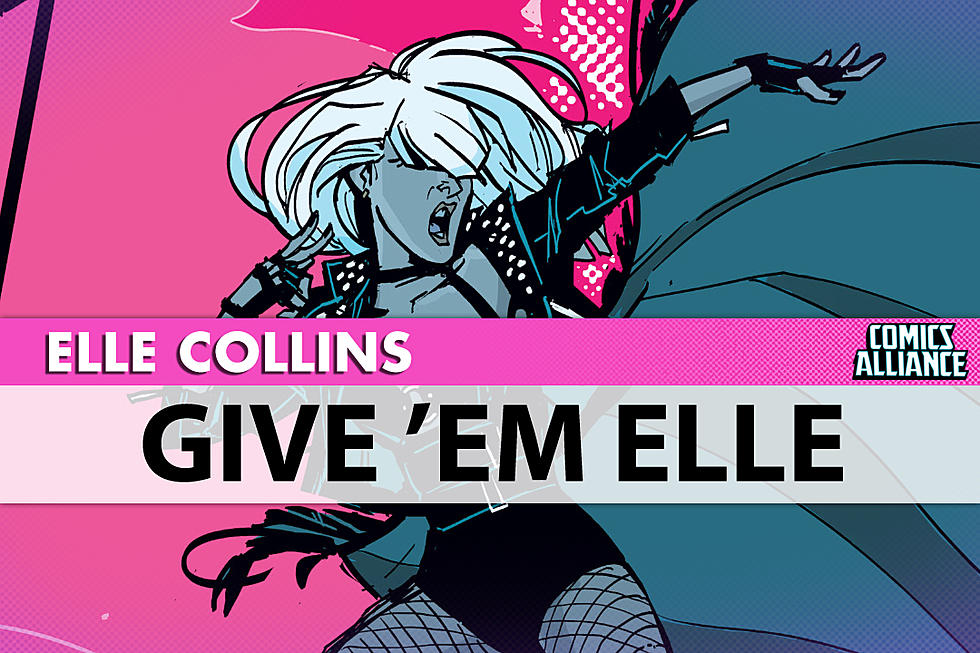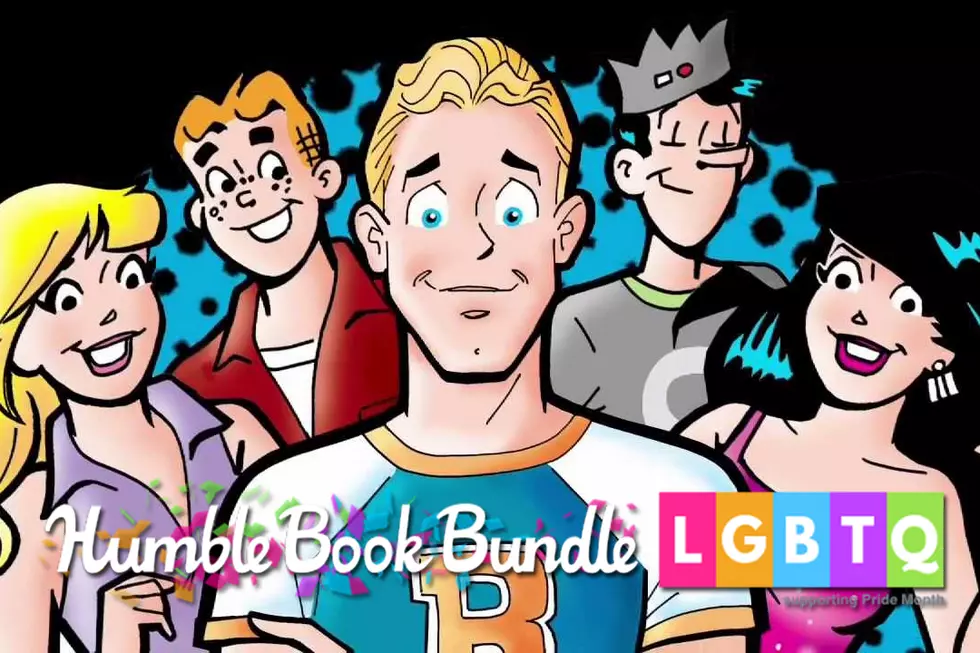
Tokyopop Is Poised to Return, But Should Creators Take a Chance?
Tokyopop is back.
The manga publisher, known for its rapid rise and subsequent implosion in the early 2000s, announced a new push toward active business at Anime Expo on July 2. Tokyopop founder Stu Levy (also known as DJ Milky) led a panel that unveiled an ad-supported comics app called Pop Comics and unspecified plans to return to manga publishing in 2016.
The response from creators who have been published by Tokyopop, and critics and commentators, was… let’s call it “less than enthusiastic”:
Some of Tokyopop’s most prominent critics are speaking out once again about the publisher’s legacy of shared-copyright contracts and unfulfilled promises. I spoke to Rikki Simons, who co-created the Tokyopop graphic novel series ShutterBox with artist Tavisha Wolfgarth-Simons, and is also known for being the voice of GIR on the Nickelodeon animated show Invader Zim; and to Sophie Campbell, artist on the new Jem comic book from IDW, whose graphic novel The Abandoned was published by Tokyopop.
Recalling Tokyopop’s contracts, which granted 50% ownership of copyright to the publisher, and Tokyopop founder and CEO Stu Levy’s business practices, Simons was clear about his feelings about their comeback:
“We don’t know if Stu Levy intends to run Tokyopop the same way he did from 1998 to 2011, whether he intends to push rotting fish with roses attached under the noses of young, impatient, and inexperienced creator,” he told me. “We hope he has changed. But we sincerely doubt it. Tokyopop had one legacy, and that was lowering the bar for creator’s rights.”
For those who don’t remember the brief but consequential Tokyopop bubble, I’ll try to illustrate why Tokyopop’s return has inspired such hostile responses. In 2004 or so, if you stepped into any Borders (a mega-chain of bookstores that, not coincidentally to this story, does not exist anymore), you would have found a manga aisle packed with thick, compact graphic novels and littered with teenagers sitting on the floor and reading. The publisher seemed to have cornered the book market for graphic novels with their translations of Japanese manga, as well as their “original English-language manga” (often abbreviated as OEL or OEM).
Tokyopop’s rise rested on innovative publishing and marketing decisions. First, and importantly, their books were inexpensive. Tokyopop reduced production overhead for Japanese translations by printing “unflipped” books that read right-to-left, and leaving sound effects untranslated, marketing them as “100% Authentic Manga.” The standard Tokyopop format was a tiny 5 inches by 7.5 inches, black-and-white, and printed on inexpensive paper stock. They eschewed the monthly floppy format and went straight for the book market with paperbacks, picking up readers who didn’t keep pull lists at their local comic book stores.
Thanks to the flood of shoujo manga like Sailor Moon and Fruits Basket, girls and young women were visibly and prolifically reading comics --- and creating them. To be honest, it was pretty exciting at the time. Graphic novel sales quadrupled between 2002 and 2007. Publishers even duplicated the Tokyopop format, with books like the original editions of Bryan Lee O’Malley’s Scott Pilgrim, Zombies Calling by Faith Erin Hicks, and the shoujo-esque Death: At Death’s Door by Jill Thompson, seeking to be shelved with their books and hoping to pick up the same readers.
How could that all go wrong? The usual way: hubris.
A good number of Tokyopop readers were also aspiring comics creators, and Tokyopop capitalized both on their eagerness and their inexperience. Tokyopop offered young artists, most in their early twenties, the opportunity to be published by the brand that was everywhere, throwing out $1000 prizes for their Rising Stars of Manga contests, and practically owning whole rows of shelves in bookstores. It was a chance for new artists to get their work and their names out there --- and all Tokyopop wanted in return was half ownership of their copyrights.
At the time, Tokyopop was so beloved that criticizing this arrangement was kind of like what running afoul of Tumblr is now --- though then, everything happened on LiveJournal. I recall being a hardened five-year comics veteran of 28, looking with jaded eyes as fresh-faced American manga-ka defended Tokyopop against all enemies, including those who had creators’ best interests in mind, like Simons and Wolfgarth-Simons.

Unlike so many of the young creators Tokyopop was publishing, Simons and Wolfgarth-Simons already had extensive experience in the comics industry when they brought ShutterBox under the Tokyopop banner. They did not accept Tokyopop’s contract as-is, and cautioned young creators against copyright co-ownership.
History has proven them right, but even so, when I asked about their experiences during this time, they were hesitant to speak out at first. “[We] were openly harangued the last time we tried to express that a shared copyright between creators and publishers is a terrible idea,” Simons told me.
“A co-ownership of copyright between a creator and publisher is a terrible, dishonest trick. A co-ownership of copyright is really a dirty version of the work-for-hire. To throw away your moral rights and share a copyright with a publisher who has more money and power than you means that, realistically, they own the whole thing… and when the publisher finally goes out of business, and it will eventually go out of business because everything, everything, everything dies eventually, your work will die with them.”
By 2008, this was coming true for Tokyopop. The publisher had a bloated catalog, and media deals that were supposed to have made their half-ownership of those copyrights profitable never materialized. In May, Tokyopop announced their Manga Pilot program, with a contract that required creators to give up their moral rights to their work, and the comics community responded with disdain and derision. Lea Hernandez called the Manga Pilot contract, “the most childish and disingenuous legal document I have ever read.”
In June of that year, the company tried to restructure, laying off half of its staff in the process. Then it jettisoned all print publication, though it continued to sell digital copies of many of its titles.
For the next few years, Tokyopop lurched into an undead state. Borders went bankrupt in March 2011, reportedly owing Tokyopop money, and most of the publisher’s remaining staff was laid off. They shuttered operations in the United States and the United Kingdom in that same year, but have maintained an office in Germany. Tokyopop’s licensing agreements with Japanese publishers expired, but the company continued to twitch out manga-adjacent projects like the web reality show America’s Greatest Otaku.
Although many series were cancelled before completion, and all of Tokyopop’s books are now out of print, Tokyopop is still a legal entity, and has retained the rights to its intellectual property, keeping comics creators’ books in a perpetual state of limbo. Tokyopop still co-owns the copyright of these works, so creators can’t take their books to new publishers to finish them, or take away Tokyopop’s right to sell digital copies. Their work, as it exists, is not theirs to do as they want with.
“Tokyopop still has the rights to The Abandoned and all the characters,” Campbell told me. “It was a 50/50 deal but that basically means they own 100%, since I can't actually do anything with 50% of a property.”
Campbell doesn’t fault Tokyopop for her decision to sign the contract. “I knew what the contract was that I was signing,” she said. “Tokyopop didn't trick me or take advantage of me.”
However, Campbell admits that she had to deal with unapproved changes to her work and reneged promises. “I was confused and angry because I was supposed to do three books, and when The Abandoned came out, Tokyopop had stealthily removed the ‘volume’ from it, like they were quietly trying to squash the whole thing. [They] only printed copies because they were legally obligated to,” she told me.
“After the book came out they didn't really market it at all --- they didn't even bring copies to the conventions they went to. I had done a bunch of concept work for volume 2, but none of it happened. It was a combination of me feeling burned and them pulling the plug and sweeping me under the rug. So that's why volumes 2 and 3 never happened and the series was left unfinished.”
Tokyopop has sometimes been credited with changing the comics publishing model in the United States, and it published the early work of many creators who have gone on to become some of the industry’s top artists, including Becky Cloonan, Amy Reeder, and Brandon Graham. Yet Simons rejects any notion of a positive “legacy.”
“It has no good legacy. Tokyopop was not a good publisher because they used contracts that demanded shared copyright on young, impatient, inexperienced creators. The talented creators they ‘discovered’ in wretched contests and who went on to do well with other publishers would have done well with anyone. Because they were already talented.”
The darkest part of Tokyopop’s influence on comics publishing, Simons said, is the creeping normalization of creators’ rights being pecked away by publishers.
“Tokyopop’s legacy is this: the increase of trickery, shared-copyrights, vouchers instead of contracts, dismantling of creators’ moral rights and destruction of estates in American publishing. Look at the history of publishing. It used to be that a writer wrote a story and the publisher negotiated for first, second, or international publishing rights. Your agent or your entertainment lawyer or you manager was the one who helped you control your movie, TV, and ancillary rights. Not your publisher.”
He cited the works of 20th century authors like J.R.R. Tolkien and Frank Herbert, which are still controlled by their estates, ensuring a greater degree of stewardship. “But now,” he continued, “thanks to the practices of companies like Tokyopop, many publishers are trying to see what they can get away with, and what they are trying to get away with is subterfuge and robbery of your potential estate.”
It seems Tokyopop has been mindful of the heavy criticism leveled at them. Pop Comics is being presented as a publishing platform in which creators own 100% of their copyright, but until we know the specifics of its contract --- what Tokyopop’s licensing arrangement will be with creators, for example --- the actual value of that copyright ownership remains to be seen. (A beta launch is being planned, and you can sign up for updates at PopComics.com, but so far nothing has been sent out.)
So what should an aspiring comics creator do? Use extreme caution. Get legal advice. And learn from what happened to comics creators like Campbell.
“When I signed with them, there was no way I could've known how things would turn out. Maybe if a clause had been included that said my series would possibly have the plug pulled on it and I wouldn't get what they had promised, and that I'd be tossed out like Tokyopop's trash, then maybe I wouldn't have signed it,” she said.
Or, you can take Simons’ advice:
“Stay away from them. You’d be better off Kickstarting a book.”
More From ComicsAlliance





![On the Nose: Sophie Campbell Talks Bodies and Blaze [Flame Con]](http://townsquare.media/site/622/files/2016/09/sophiecampbell-feat.png?w=980&q=75)



